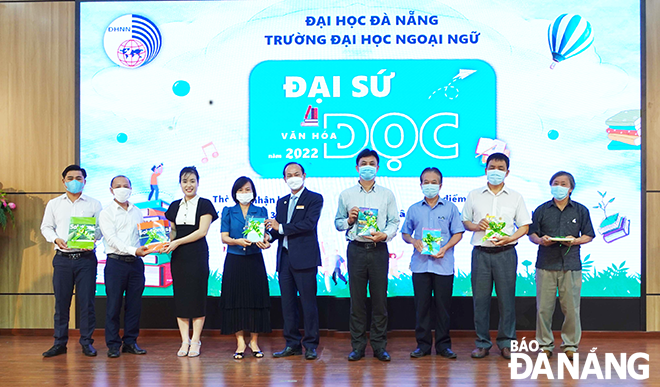Inspiring and promoting reading culture amongst Vietnamese
These days, reading culture has strongly been influenced by the entertainment industry and cutting-edge digital technology so the revival of reading culture in the spirit of the National Cultural Conference 2021 needs to be paid attention to and invested in a methodical and serious direction.
 |
| On April 18, 2022, the University of Foreign Language Studies (UFLS) - University of Danang (UD) held the Week of Reading and Reading Culture in 2022 with the theme "Sowing happiness through each page of books". IN THE PHOTO: Officials and lecturers of the UFLS- UD launched a donation to the UFLS community bookcase. |
Few people read books
According to statistics for the 2014-2019 period released by the Authority of Publication, Printing and Distribution under the Ministry of Information and Communications (MIC), the number of printed titles increased by 30%, and the number of printed copies increased by 19%. However, the number of books released only increased by 16%.
According to the report in 2021, the total number of publications deposited, the number of publications released, and the distribution revenue all decreased, by 9%, 31.8%, and 21.6% respectively. The rate of publications per capita in 2021 decreased by 1.2%.
Mr Le Hoang, Vice Chairman of the Viet Nam Publishers Association, said that the first problem is that the number of published books has grown at a low rate, which means a few readers have access to books.
Second, the percentage of people reading books is still low compared to the population. The publication rate per capita is more than 4%, but excluding textbooks, this rate is only approximately 1.4%, lower than many other countries in Asia.
According to people who have worked in the publishing industry for a long time, the percentage of people reading books in particular and the reading culture in Viet Nam, in general, have not shown signs of improvement. That is because reading habits have not been formed in the community, school and family. Moreover, it is strongly influenced by the wave of the entertainment industry and digital technology.
According to Mr Le Hoang, obstacles to the development of reading culture today have come from three factors. First, there has been still a lack of reading periods in schools. Second, parents do not pay much attention to and help children develop the habit of reading books from an early age. Lastly, publishers and book companies have not paid attention to marketing and measures to promote reading culture.
At a conference on publication on January 21, Mr Tran Thanh Lam, the deputy director of the Central Propaganda Department, pointed out the internal limitations of the management, publishing and distribution activities such as the lack of attention of some governing bodies in operating and monitoring publishing activities; the size of the publishers is generally small, several publishers are not qualified to expand and develop activities in the direction of modernity and specialization; the planning of the publishing industry has not been effective; impacts of the COVID-19 pandemic.
Positive movements
Pursuant to the guidelines and tasks set out by the National Cultural Conference, the Prime Minister signed Decision No. 1862/QD-TTg on November 4, 2021, to implement the first Viet Nam Book and Reading Culture Day, which based on the previous Viet Nam Book Day on April 21, in order to affirm the role and importance of books in improving knowledge and skills, developing thinking, educating and training human resources, encouraging and developing the reading movement in the community, creating a favourable reading environment.
Over the past time, the MIC has implemented a series of activities such as the scheme of the National Book Program to promote publication, promotion and distribution in a bid to care for the development of the reading culture.
The scheme of the National Book Program for the period of 2022-2026 has been conducted with the new publication and re-publishing of 500 books in the form of publications guaranteed by the State budget with a variety of genres such as politics, society and culture, foreign information, adolescents - children.
In addition, the education - training, and culture sectors have also stepped up the implementation of building foundations and organized activities to promote reading culture in schools and communities. Publishers have also made efforts to publish new publications having quality content and good-looking appearance to attract readers; deployed the application of e-books, audiobooks being suitable to the conditions of digital transformation.
 |
| Reading is a cultural beauty that helps people expand knowledge in all fields. Photo: DAC MANH |
Synchronize all methods
The journey of revitalizing the reading culture that contributes to promoting the cause of building culture is like a long-distance run because after warming up, you must maintain endurance and need regular energy replenishment to move forward destination.
At the seminar "Reading culture - opportunities, challenges and recommendations" organized by the Vietnam Publishers Association on the evening of April 15, Mr Le Hoang said that to develop the reading culture, it is necessary to promote synchronously 3 pillars, that are managers, State management agencies; social communities and each individual in the society whose centre is the reader.
He added it is necessary to establish a National Committee for the development of reading culture in Viet Nam to unify the direction and implementation of activities. Along with that, the Vietnam Publishers Association should organize research and survey every 5 years on the status of reading in society as a basis for building long-term plans, comprehensively and synchronously developing a reading culture.
The MIC will add several provisions on content to develop the reading culture in the upcoming revision of the Law on Publication. The Government needs to promote reading culture activities, the State need to invest more in cultural - general libraries, especially school libraries, which have enough operating funds and develop on a par with other library systems in ASEAN.
Besides, the Ministry of Education and Training should focus on organizing teaching and learning according to the flipped classroom method and guided reading, which encourages teachers and students to do the research and share information from resources of the library; and implement reading lessons in the school effectively. The Ministry of Culture, Sports and Tourism need to put reading and building family bookcases into the criteria of cultural families; activate solutions to encourage parents to read with their children.
In conclusion, with the foundations prepared over the past decades, the launch of the first Viet Nam Book and Reading Culture Day on April 21, 2022, and asynchronous and persistent momentum, the reading culture will surely envision a good destination.
Reporting by ANH QUAN- Translating by T.VY